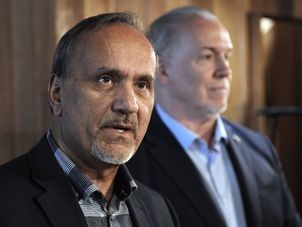VICTORIA -- The business community has resigned en masse from a review of B.C.'s workers' compensation system, saying the government-appointed reviewer is regurgitating recommendations made a decade ago for the B.C. Federation of Labour.
A group of 46 associations representing the bulk of the business sector -- including the B.C. Business Council, the Greater Vancouver Board of Trade, the Tourism Industry Association of B.C. and the B.C. Council of Forest Industries and Restaurants Canada -- announced their immediate pullout from a review into the rights of injured workers, how much compensation they get and the responsibilities of employers. The review is headed by retired labour lawyer Janet Patterson.
"When you undertake a review in this area, it has got to be done ensuring it's a fair independent review that is going to strike an appropriate balance," said Chris Gardner, president of the Independent Contractors and Businesses Association of B.C., one of the 46 groups that quit the process.
"The concern is Janet Patterson is biased in how she approaches this review and the focus will be on fairly significant and dramatic wholesale changes in WorkSafeBC."
The business groups that withdrew include associations representing small businesses, agriculture, seniors' care providers, construction, mining, engineering, hotels, restaurants, road builders, home builders, manufacturing, trucking and roofing companies.
Ultimately, employers fear changes to workers' compensation could increase their costs. WorkSafeBC is funded by premiums paid by employers.
However, unions say WorkSafeBC has a sizable surplus and all that is being sought is a rebalancing of the system to better help injured workers and their families.
The business groups say Patterson abruptly added supplementary "selected issues" to the review on Aug. 6. Patterson wrote that the topics came up during months of public consultation. But the selected issues also mirrored almost all of the 24 recommendations Patterson made in a 2009 report about workers' compensation she co-wrote for the B.C. Federation of Labour.
Some of the selected issues included: Entrenching a policy of compensation regardless of who is at fault, allowing the WorkSafeBC board to reopen its decisions for review at any time, treating compensation for chronic pain like other disabilities, basing wage benefits on 100 per cent of a person's net earnings, calculating future lost earnings for an injury, and reinstating "medical review panels" like those used in Alberta and Washington state to provide independent medical exams.
"Those are all common sense things," said Laird Cronk, president of the B.C. Federation of Labour. "If you took that (list) down the streets of Vancouver and asked if those things made sense for injured workers and their families, I think most people would say they do."
Labour Minister Harry Bains said the review will still be completed because it has already gone through three rounds of public consultation and has received written submissions from groups including the business community.
"I'm reaching out to them and hopefully will convince them to get engaged again because their views are really important to me," Bains said Thursday. "You can't make good decisions if one important part of your stakeholders are not at the table."
WorkSafeBC has a more than $2 billion surplus, and Bains said the types of changes being discussed would not increase costs for employers. "The money is there," he said. "My goal, again, is to not impact employers and their premiums."
The disagreement has a long history and deep political undertones.
Patterson's 2009 report focused on reversing changes to workers' compensation made by the B.C. Liberals in 2002.
The Liberals had, in turn, overhauled many of the NDP's policies from the 1990s in order to save money for businesses, who traditionally support the Liberals. Now, the NDP is pushing the system in the opposite direction to help unions that traditionally support New Democrats, the Opposition Liberals allege.
"What John Horgan and the NDP have cooked up is just another smoke and mirrors review to make it look like they aren't just going to do whatever their union donors want," said Liberal critic John Martin.
BC's Chamber of Commerce said it was happy with how the NDP government conducted a review of the Labour Relations Code (which covers bargaining and how workers join unions) over the last year, which included three-person panel that represented unions, employers and an experienced arbitrator.
"But regrettably, when it comes to the current WorkSafeBC review, we are not seeing that same balanced, fair, independent approach," said Val Litwin, chamber CEO.



